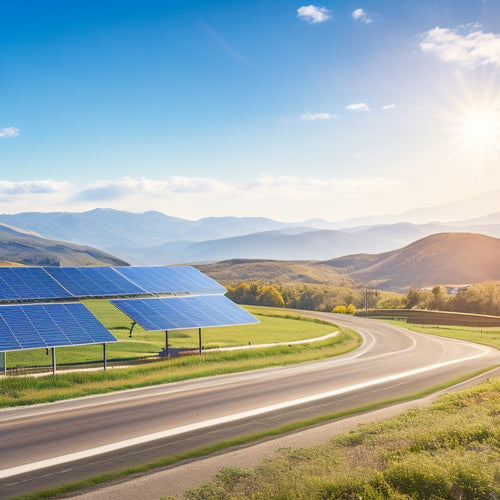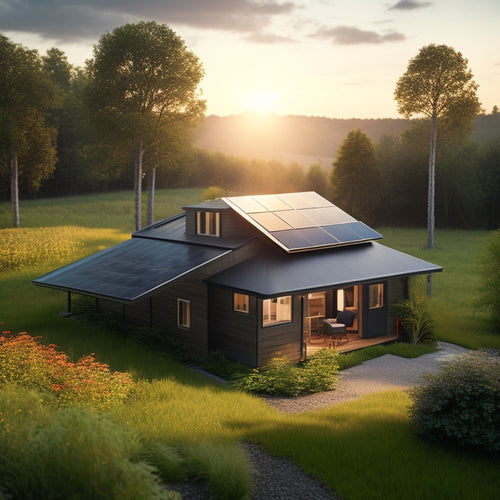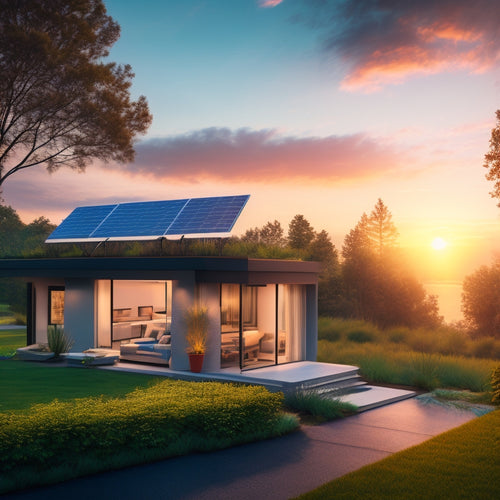
Best Off Grid Inverter Systems for Homes
Share
When looking for the best off-grid inverter systems for your home, consider efficiency, type, and cost savings. Systems with efficiency ratings above 90% guarantee you make the most of renewable energy, minimizing waste. Pure sine wave inverters offer superior compatibility with sensitive electronics, while modified sine wave inverters are budget-friendly for simpler devices. Assess your energy requirements by calculating daily needs to choose the right capacity. With these systems, you'll enjoy long-term savings on utility bills and enhanced energy independence. Exploring further will reveal more beneficial information into optimizing your off-grid experience.
At a Glance
- Choose pure sine wave inverters for compatibility with solar systems and power-hungry appliances, ensuring smooth and reliable energy output.
- Calculate daily energy needs accurately to select an appropriate inverter system that meets your household consumption and peak demand.
- Consider high-efficiency inverter systems with ratings above 90% to minimize energy waste and maximize savings on utility bills.
- Evaluate modified sine wave inverters as a cost-effective option for basic devices, providing lower initial investments for essential power needs.
- Implement energy monitoring tools to identify usage patterns, optimizing inverter efficiency and extending battery life during peak consumption times.
Reliable Power During Outages
When the power goes out, having a reliable backup power source becomes essential for maintaining your home's functionality.
An efficient inverter system guarantees that your appliances and devices stay operational during these outages, helping you avoid disruptions.
Implementing renewable innovations can further enhance your energy management strategies, assuring you have a sustainable power source even in emergencies.
Understanding the importance of both backup power and inverter efficiency can greatly enhance your resilience in challenging situations.
Importance of Backup Power
In the event of a power outage, having a dependable backup power source is vital for maintaining your home's functionality and comfort. You want to guarantee that your family stays safe and connected, even when the grid fails. With solar integration in your inverter system, you're not just relying on conventional fuel sources but embracing a sustainable solution that improves battery longevity.
Here's a quick look at the emotional impact of reliable backup power:
| Benefit | Emotional Impact |
|---|---|
| Continuous power supply | Peace of mind |
| Functioning appliances | Comfort and normalcy |
| Communication access | Connection with the outside world |
When you invest in a sturdy backup power system, you're not only preparing for outages; you're also reclaiming your freedom from dependency on the grid. This independence allows you to manage your energy needs effectively, guaranteeing that your home remains a haven of security. By embracing solar integration, you can improve your battery longevity, giving you the confidence that your backup power will last when you need it most.
Inverter System Efficiency
A highly efficient inverter system is crucial for ensuring reliable power during outages. With inverter technology advancements, you can maximize energy conversion and minimize losses, making your system more effective. This is particularly significant when you're relying on renewable energy integration, as these systems often depend on consistent and reliable power delivery.
When choosing an inverter, consider its efficiency rating. A higher efficiency means less energy wasted, which translates into more power available for your household needs—especially during critical times like outages. Advanced inverters also offer features like automatic switching, which can seamlessly shift from grid power to your backup system, reducing downtime.
Moreover, modern inverter systems can optimize energy usage by prioritizing essential loads during an outage, ensuring that your most critical devices stay powered. This capability is crucial for maintaining comfort and safety when the grid fails.
Cost Savings Over Time
When you invest in an off-grid inverter system, you're not just securing reliable power; you're also setting yourself up for long-term energy savings.
Over time, you'll notice a significant reduction in your utility expenses as you rely less on traditional energy sources. This shift can lead to substantial financial benefits, making the initial investment even more worthwhile.
Long-term Energy Savings
While investing in an off-grid inverter system may seem intimidating at first, the long-term energy savings can be considerable. By utilizing renewable energy sources like solar or wind, you're not just contributing to sustainable living; you're creating the opportunity for energy independence.
Over time, the initial investment in an inverter system pays off as you rely less on conventional energy sources. When you generate your own power, you're shielded from fluctuating energy prices and potential utility rate hikes. This means more predictable budgeting, allowing you to allocate funds elsewhere.
Additionally, many off-grid systems have low maintenance costs, which further boosts your savings. Consider that once your system is installed, the ongoing costs are considerably lower than traditional grid-connected systems.
You'll find that your electricity bills dwindle, and in some cases, you may even eliminate them altogether. Ultimately, investing in an off-grid inverter system is a strategic move toward financial freedom and sustainable living.
The long-term energy savings not only enable you to take control of your energy consumption but also contribute to a greener planet for future generations.
Reduced Utility Expenses
Reduced utility expenses are one of the most persuasive reasons to adopt an off-grid inverter system for your home. By generating your own power, you can considerably cut down on monthly electricity bills, moving closer to true energy independence. Instead of relying on fluctuating utility rates, you utilize renewable energy sources, allowing you to stabilize your expenses and plan your budget more effectively.
Over time, the cost savings from an off-grid system can be substantial. You'll notice a decrease in your reliance on the grid, especially during peak usage hours when electricity costs soar. As you invest in sustainable living, you'll see the initial investment in your inverter system pay off through reduced utility costs.
Moreover, the shift to an off-grid system promotes freedom from utility companies, giving you control over your energy production. As energy prices continue to rise, your ability to generate your own power becomes even more important.
Ultimately, adopting an off-grid inverter system isn't just about cost savings; it's about embracing a lifestyle that prioritizes sustainability and independence. You'll not only save money but also gain peace of mind knowing you're less affected by external energy fluctuations.
Inverter Types and Specifications
When selecting an inverter for your off-grid system, you'll encounter two main types: pure sine wave and modified sine wave inverters.
Pure sine wave inverters provide cleaner power, making them ideal for sensitive electronics, while modified sine wave inverters are more cost-effective but may not support all devices.
Additionally, it's important to evaluate the compatibility of your inverter with other components in your solar power battery backup systems, such as energy monitoring and deep cycle batteries.
Understanding these differences will help you make an informed choice customized to your energy needs.
Pure Sine Wave Inverters
Pure sine wave inverters are essential for anyone looking to harness the full potential of off-grid power systems. They provide a smooth, consistent output that mirrors the electricity supplied by utility companies, making them perfect for all types of devices, particularly sensitive electronics.
When you're considering solar integration for your home, opting for a pure sine wave inverter guarantees compatibility with solar panels and battery systems, maximizing efficiency and performance.
With various inverter brands available on the market, you'll find options customized to your specific needs. High-quality brands often offer advanced features like built-in surge protection and monitoring capabilities, assuring your system runs smoothly and efficiently.
These inverters also tend to have a longer lifespan compared to modified sine wave models, giving you peace of mind when investing in your energy independence.
Additionally, pure sine wave inverters can handle the demands of power-hungry appliances, such as refrigerators and microwaves, without risk of damage.
In short, if you value reliability and performance in your off-grid setup, a pure sine wave inverter is a wise choice that can greatly enhance your energy autonomy.
Modified Sine Wave Inverters
Modified sine wave inverters serve as a cost-effective alternative for those exploring off-grid power solutions. These inverters generate a waveform that's simpler than pure sine waves, making them cheaper to produce and purchase.
While they may not deliver the same level of efficiency or compatibility with sensitive electronics, they still offer noteworthy inverter advantages for many everyday applications.
When you opt for modified sine wave inverters, you typically find they work well with basic devices like lights, fans, and some power tools. If your off-grid lifestyle leans toward essential appliances rather than high-tech gadgets, they can be a practical choice.
Additionally, their lower costs can greatly reduce your initial investment, allowing you to allocate funds elsewhere in your energy system.
However, it's crucial to evaluate the limitations. Some appliances, particularly those with motors or complex circuitry, may not operate efficiently or could even sustain damage.
Assess Your Energy Requirements
To effectively assess your energy requirements, start by calculating your daily energy needs based on the appliances and devices you use.
Pay special attention to identify peak usage times, as this will help you understand when your energy demand is highest.
This information is essential for selecting an off-grid inverter system that meets your household's unique energy profile.
Calculate Daily Energy Needs
When planning an off-grid inverter system, accurately calculating your daily energy needs is vital for ensuring that your home remains powered efficiently. Start by evaluating your energy consumption based on your daily habits. This means taking stock of every appliance and device you use, their wattage, and how long you use them each day.
Here's a simple table to help you get started:
| Appliance | Wattage | Daily Usage (hours) | Daily Energy (Wh) |
|---|---|---|---|
| Refrigerator | 150 | 24 | 3600 |
| LED Lights | 10 | 5 | 50 |
| Laptop | 50 | 8 | 400 |
| Microwave | 1000 | 1 | 1000 |
To find your total daily energy needs, simply sum the Daily Energy (Wh) column. Understanding your energy consumption is essential for selecting the right off-grid inverter system. By knowing your daily habits and energy requirements, you can create a system that offers true freedom and independence from the grid.
Identify Peak Usage Times
Identifying peak usage times is vital for optimizing your off-grid inverter system's efficiency. By understanding when your household experiences peak demand, you can better manage your energy resources and enhance your system's performance.
Start by implementing energy monitoring tools to track your consumption patterns over several days or weeks. This data will reveal when your energy use spikes, whether it's during the morning rush or in the evening when everyone's home.
Once you have this information, think about adjusting your habits or scheduling high-energy tasks, like laundry or charging devices, during off-peak hours. This strategic planning not only helps in maximizing your inverter's efficiency but also prolongs battery life and reduces wear.
Additionally, if you notice that peak demand consistently exceeds your system's capacity, it may be time to reflect on expanding your energy resources. Being proactive about your energy usage allows you to maintain freedom from grid dependence while ensuring you have enough power when you need it.
Higher Efficiency Ratings Available
When selecting an off-grid inverter system, energy conversion efficiency is essential.
Higher efficiency ratings mean more of the energy generated is converted into usable power, reducing waste and maximizing your investment.
Understanding these ratings can help you choose a system that aligns with your energy needs and sustainability goals.
Energy Conversion Efficiency
Energy conversion efficiency is a critical aspect of off-grid inverter systems, directly impacting the overall performance and sustainability of your home energy setup. The efficiency rating of your inverter determines how well it converts stored energy into usable electricity. Higher efficiency means more power from your energy harvesting sources, allowing for better system integration with solar panels or wind turbines.
When you choose an inverter with an efficiency rating above 90%, you're maximizing the energy harvested from your renewable resources. This translates to less energy waste and more reliable power for your home. If you're serious about achieving energy independence, investing in models with higher efficiency ratings is essential.
Moreover, consider how the inverter interacts with your entire energy system. A well-integrated setup not only enhances conversion efficiency but also improves the longevity of your components.
Pay attention to features like maximum power point tracking (MPPT), which optimizes energy extraction from your solar panels.
Frequently Asked Questions
How Long Can an Off-Grid Inverter System Last?
An off-grid inverter system can last 10 to 15 years, depending on battery lifespan and inverter efficiency. Regular maintenance and ideal usage can maximize performance, ensuring you enjoy uninterrupted power and freedom from the grid.
Can I Use an Off-Grid Inverter for a Tiny Home?
Yes, you can definitely use an off-grid inverter for a tiny home. Its efficiency enhances energy independence, allowing you to maximize the tiny home benefits while utilizing renewable resources for a more sustainable lifestyle.
What Maintenance Is Required for Off-Grid Inverter Systems?
Maintaining your off-grid inverter system isn't intimidating. You'll need regular battery maintenance, inverter cleaning, system monitoring, and performance testing. By staying proactive, you'll guarantee peak performance and enjoy the freedom of reliable power.
Are Off-Grid Inverters Noisy During Operation?
Off-grid inverters can vary in noise levels based on inverter technology. While some units operate quietly, others might produce noticeable sounds. You'll want to choose an inverter that aligns with your preference for peace and freedom.
How Do I Choose the Best Brand for an Inverter?
To choose the best inverter brand, assess inverter efficiency and brand reputation. Research user reviews, warranty provisions, and performance ratings. Prioritize trusted brands that demonstrate reliability, ensuring you achieve the freedom and independence you seek.
Explore More
In choosing the best off-grid inverter system for your home, you're not just investing in equipment; you're laying the groundwork for energy independence. Imagine your home as a lighthouse, standing strong against the storm of power outages, illuminating your life with reliable energy. By evaluating your energy needs and selecting the right inverter, you can enjoy long-term cost savings and higher efficiency. Welcome the freedom of off-grid living—you deserve a resilient and sustainable energy solution.
Related Posts
-

Is Switching to Green Energy Solutions Easy
Switching to green energy solutions isn't just easy; it's also beneficial. You can greatly cut utility costs and enjo...
-

Diy Off Grid Solar
By embracing DIY off-grid solar, you can break free from grid dependence, slashing your energy bills by up to 90% and...
-

The Future of Residential Energy Storage
The future of residential energy storage looks promising and cost-effective for you. With lithium-ion battery prices ...


